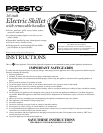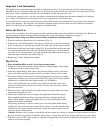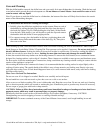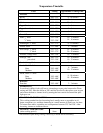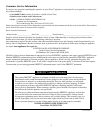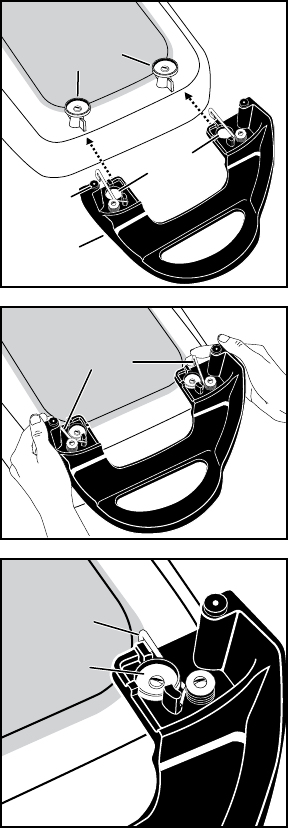
2
Important Cord Information
This appliance has a polarized plug (one blade is wider than the other). To reduce the risk of electric shock, this plug is
intended to t into a polarized outlet only one way. If the plug does not t fully into the outlet, reverse the plug. If it still
does not t, contact a qualied electrician. Do not attempt to modify the plug in any way.
A short power supply cord (or cord set) is provided to reduce the risk resulting from becoming entangled in or tripping
over a longer cord. Extension cords may be used if care is properly exercised in their use.
If an extension cord is used, the marked electrical rating of the extension cord should be at least as great as the electrical
rating of the appliance. The extension cord should be arranged so that it will not drape over the countertop or tabletop
where it can be pulled on by children or tripped over unintentionally.
Before the First Use
As received, your skillet will be in its storage position with the handles removed and placed in the skillet base. Remove all
packing material and then wash the skillet according to the “Care and Cleaning” instructions on page 3.
Important: Before using your skillet, it must be fully assembled as instructed below:
1. Place the skillet base upside down on a at surface (Fig. A).
2. Position one of the skillet handles, feet side up, over the base so that the two handle
holes are directly over the latch clip catches. The latch clips will rest on the catches.
3. Pull the latch clips back beyond the catches (Fig. B) and push the handle down until
it is rmly seated against the skillet base. Release the latch clips to lock the handle
into place. To be sure the handle is securely attached, check that both latch clips are
under the edge of the latch clip catches (Fig. C).
4. Repeat steps 2 and 3 with the other handle.
How To Use
1. Place assembled skillet on a dry, level, heat resistant surface.
2. If desired, “season” the nonstick cooking surface by rubbing lightly with cooking
oil. Remove excess oil with a paper towel.
3. Insert the Control Master
heat control probe into the skillet so the two electrical
pins on the skillet are fully inserted into the heat control. Connect cord to outlet.
4. Turn Control Master
heat control to desired temperature (see page 4 for cooking
temperatures). Remove cover and preheat skillet. Pilot light goes off when selected
temperature is reached (this takes approximately 5 to 10 minutes).
Note: As the skillet heats up, you may hear a clicking sound; this is due to the
expansion of the metal as it heats. It is normal. You may also notice this sound as
the unit cools down.
5. Prepare food for cooking. Because the skillet features a nonstick nish, food may
be prepared with little or no oil.
6. Place food in skillet and cook according to the temperature-timetable (page 4).
Heat should be adjusted according to personal preference and particular food
being cooked. During cooking, pilot light will go on and off indicating desired
temperature is being maintained.
The pouring spout may be used as a handy spoon rest and spatula holder during
cooking. For best results use heat-resistant nylon, plastic, or wooden utensils in the
skillet. Do not use metal utensils as they may scratch the nonstick surface. Do not
cut foods on the cooking surface.
Caution: When the cover is placed on the skillet and the contents are boiling, it is normal for some steam to vent from
the pour spout. Do not reach for the handles when steam is venting from the spout. Contact with steam can cause burns.
7. Turn heat control to OFF when cooking is completed. Unplug heat control from wall outlet then from appliance. Allow
skillet to cool before cleaning.
Fig. B
Latch clips
Latch clip
catches
Skillet
handle
Handle
holes
Skillet
base
Fig. A
Latch clip
Latch clip
catch
Fig. C
Rubber
foot



